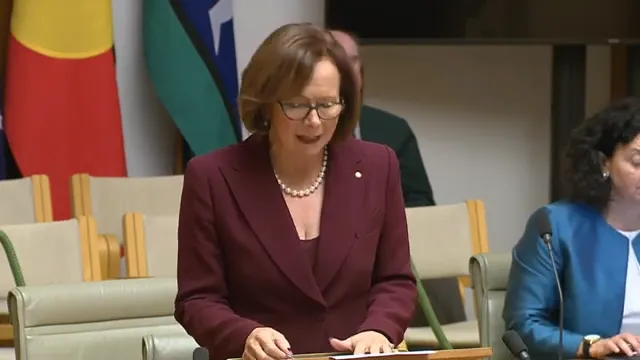Their viability is at stake

Dr WEBSTER (Mallee) (18:06): I move:
That this House:
(1) notes that:
(a) fourteen months ago, the Minister for Infrastructure, Transport, Regional Development and Local Government referred the local government sustainability inquiry to the Standing Committee on Regional Development, Infrastructure and Transport because local government faced 'pressing issues' and that the inquiry was 'long overdue';
(b) local councils are finding it increasingly difficult to maintain their financial sustainability, especially in the regions;
(c) the President of the Australian Local Government Association, Matt Burnett, asserts that 'financial sustainability is the biggest challenge facing our sector' with many councils 'at breaking point after years of delivering more local services and infrastructure with less funding';
(d) the Government-dominated inquiry only delivered an interim report 11 months after it started, and the inquiry lapsed at the dissolution of the House of Representatives;
(e) the inquiry's interim report made no recommendations; and
(f) the interim report identified emerging themes including:
(i) the significant expansion in the role of local government over time, much of which is due to cost shifting from other levels of government;
(ii) calls for a review of the Financial Assistance Grants program, and in particular the distribution formula, quantum of the funding pool, indexation methodology, and the national principles;
(iii) concerns by councils about the reliance on competitive grant programs requiring co-contributions;
(iv) limits to revenue generation in some areas due to rate capping in Victoria and rate pegging in New South Wales; and
(v) considerable skills shortages experienced by councils which are exacerbated in the regions; and
(2) calls upon the Minister, as a first order of business, to refer the matter to the committee afresh to continue the unfinished inquiry and let it deliver a final report, for the sake of the 537 local councils and shires around the country.
In my first contribution in this place as the shadow minister for local government, I was already well familiar, as were my colleagues in the Nationals, with the challenges that shires and councils face, because, unlike those opposite, we have multiple councils—if not a dozen or more in cases like Mallee—in our electorates. Ours are small, rural councils with large geographical areas and small rate bases. Financial sustainability is not a whisper in regional Australia; it is the ongoing No. 1 agenda item for every council meeting. The President of the Australian Local Government Association, Matt Burnett, agrees, saying that this is the biggest challenge facing the sector with many councils 'at breaking point'. Their viability is at stake. Rural and regional councils with small populations dispersed over vast distances, such as the West Wimmera and Yarriambiack shires in my electorate, have limited income but many hundreds of kilometres of roads to maintain. Victorian councils' sustainability challenges are exacerbated by the Victorian government's rate capping, which, for the 2025-26 financial year, limits increases in total rate revenue to three per cent per annum in Victoria.
Many councils, especially those in the regions, often pick up the bill when failed markets and centralisation mean essential services like aged care, child care and health care are failing. West Wimmera Shire Council in the south-west of Mallee includes Kaniva, Goroke and Edenhope and has been providing local people with childcare and aged-care services over many years. Yarriambiack Shire Council also provides early learning services, and Northern Grampians delivers aged-care services, just to name a few. In other parts of the country, rural councils run primary healthcare services, demonstrating the cost-shifting from other levels of government putting strain on council finances. Fourteen months ago, Catherine King, Minister for Infrastructure, Transport, Regional Development and Local Government referred the question of local government sustainability as an inquiry to the Standing Committee on Regional Development, Infrastructure and Transport because local government faced pressing issues, and the inquiry was long overdue.
Fellow minister Kristy McBain said the inquiry built upon feedback received in the preceding 18 months, yet the Labor dominated inquiry only delivered an interim report 11 months after it started and was then prorogued for the election. The inquiry's interim report made no recommendations. Not only did the interim report identify as an emerging theme that councils had limited means to generate revenue yet had an expanded role due to cost-shifting from other levels of government; a significant number of submitters called for a review of the financial assistance grants program. Submitters also called out the reliance on competitive grants processes that require significant co-contributions, which are very difficult for small rural councils to comply with. Worse still, state governments like the Allan Victorian Labor government have cut funding programs, like the Regional Jobs and Infrastructure Fund, that supported regional shires with co-contributions.
The financial assistance grants scheme is a critical funding source for local government. These grants, which councils and shires can use to address local priorities, are paid and distributed via state and the Northern Territory governments. General purpose funding is supposed to be distributed according to horizontal equalisation so that similar services can be provided in councils around the country for similar investment or effort. But the federal FA grant distribution principles are not enforced or enforceable; states and territories have unfettered power to distribute according to their own priorities. Inquiry submitters called for a review of various components of the program. Local governments are in dire straits, especially in regional Australia.
I call on Minister Catherine King to refer the matter to the committee afresh, to continue the unfinished inquiry, and let it deliver a final report for the sake of the 537 councils and shires around the country.



